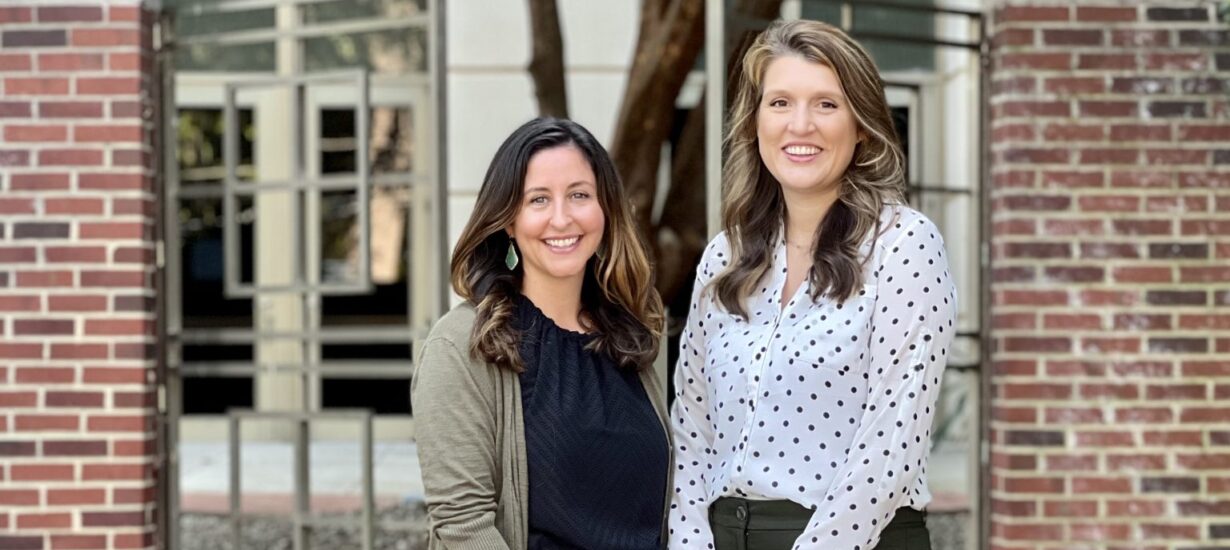UNC Leads New Behavioral Health Center

Two professors in the UNC School of Social Work will direct a new, federally funded Behavioral Health Workforce Research Center in partnership with the UNC Cecil G. Sheps Center for Health Services Research.
The new Behavioral Health Workforce Research Center is funded by a $4.5 million, five-year grant from the national Health Resources and Services Administration and will join eight other federally funded centers across the country, including one already established at Sheps, that collect, analyze and report data to help local, state and federal decision makers understand health workforce needs.
Leading the charge for UNC are Brianna Lombardi ’18, an assistant professor in the department of family medicine and a research assistant professor in the School of Social Work, and Lisa de Saxe Zerden, an associate professor in the School of Social Work and director for Interprofessional Education and Practice. Lombardi will serve as director and lead investigator. Zerden will serve as deputy director and co-investigator.
This marks the first time that a HRSA center will be led by social workers.
Lombardi is already serving as deputy director for the HRSA-funded Carolina Health Workforce Research Center, which has operated within Sheps for about 10 years. She said it’s hard to underscore the importance of the new center.
“For folks with mental health needs, less than half access care, and for individuals dealing with addiction, less than 10 percent receive treatment,” she said. “Workforce challenges are directly tied to access for those impacted by behavioral health problems, yet behavioral health workforce is understudied compared to other health professions. The UNC BHWRC will focus on understanding how we can position and retain the behavioral health workforce to increase care by using the full scope of behavioral health workers, including social workers, psychologists, counselors, recovery support specialists, peers, psychiatrists and many others.”
Lombardi said UNC already has nine formal education training programs for the behavioral health workforce with which the new center can collaborate and connect. Zerden said everyone is impacted by behavioral health.
“Imagine not having someone to help address these needs before they worsen,” Zerden said. “In too many areas across the United States, in our backyard in North Carolina, workforce issues inhibit who has access to care and how behavioral needs can be addressed. From health settings to schools, to social service agencies, to justice systems and beyond, the behavioral health workforce is essential to how our society functions. We’re proud to do this research to amplify the roles, scope and pathways for behavioral health workers to continue their essential work.”
The new center is being established in the midst of a nationwide opioid crisis and when behavioral health needs have skyrocketed due to the stress of the COVID-19 pandemic.
According to Mental Health America, which was founded in 1909 and, according to its website, is the nation’s leading community based nonprofit dedicated to addressing the needs of those living with mental illness, nearly 50 million people – almost 20 percent of American adults – have experienced a mental illness. Depression and anxiety among youth have been of significant concern, with 15 percent experiencing a major depressive episode in the past year, and nearly one in three going without treatment.
Lombardi said adequately addressing mental health issues requires more than simply expanding the behavioral health workforce. “For us, access is not just, ‘Do we have enough workers,’ ” she said. “It’s more like, ‘Do we have enough of the right people in the right places who have the skills and training needed and who are representative of the communities they serve?’ ”
During each year of the grant, the research team will work with other Carolina campus partners, such as family medicine and psychiatry, to complete numerous studies addressing a variety of issues – from the experiences of underrepresented minority providers, to the educational pathways of diverse students into graduate social work programs, to screenings for transitional age youth, to adequate training for peer support providers and insurance payment and reimbursement for services.
Zerden cited the work as highly meaningful and important.
“At the end of the day, we want to make sure people have the behavioral health treatment they need,” she said. “No one with behavioral health issues should be suffering. Knowing that the BHWRC will be part of the solution to help produce needed evidence to facilitate that treatment and advance our understanding of the behavioral health workforce feels very rewarding.”
– Laurie D. Willis ’86
